Index relies entirely on the support of donors and readers to do its work.
Help us keep amplifying censored voices today.
[vc_row][vc_column][vc_video link=”https://youtu.be/HmK19Kwc6lY”][vc_column_text]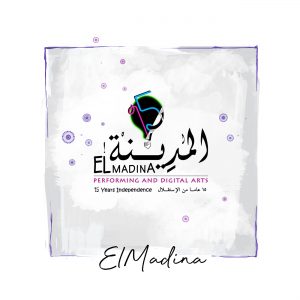 ElMadina for Performing and Digital Arts is a group of artists and arts managers who combine art and protest by encouraging Egyptians to get involved in performances in public spaces, defying the country’s restrictive laws.
ElMadina for Performing and Digital Arts is a group of artists and arts managers who combine art and protest by encouraging Egyptians to get involved in performances in public spaces, defying the country’s restrictive laws.
ElMadina’s work encourages participation — blending performances, story-telling, dance and training on human rights and citizenship — to transform public spaces and marginalised areas in Alexandria and beyond into thriving environments where people can freely express themselves.
Their work blends various artistic practices — street theatre, artistic training and grassroots advocacy — to encourage free expression in a country in which public space is shrinking under the weight of government distrust of the artistic sector.
Under the current president Abdel Fattah el-Sisi, civil society has come under attack. A 2013 Protest Law restricts demonstrations and art in public spaces. Over 500 websites are currently blocked. The arts sector is tightly regulated and the use of foreign funds is restricted. A 2018 law prohibits any festivals that have not been authorised by a government committee.
Some of their work takes the form of ‘advocacy street theatre’: Street Carnival, a 2015-16 series of performances, showcased Egypt’s marginalised cultures; Training in the Street use the public realm to stage theatre training workshops for artists and the public.
Another project, Street Theater in Egypt, challenged Egypt’s Protest Law, which regulates arts in public spaces, and produced two legal studies that were referenced in the case filed against the constitutionality of the law.
As a result of their activity, ElMadina have come under growing government pressure, and had to close their office a few months ago. They cite “a lot of pressure in many different ways”; including trouble with their landlord (a governmental institution); obstacles in receiving funds; unofficial interrogations; denial of event approvals; and being put on the list of people tracked to be investigated prior to travelling.
In November 2018, ElMadina launched The Picnic, a research project and interactive artistic installation that seeks to involve the audience in monitoring the transformation of public spaces in Egypt.
Raya, Sakina & Cavafy uses the stories of two serial killers and a poet to make the audience reflect on Egypt’s cultural policies. It took the form of an exhibition and a performance that will premiere in 2019. ElMadina also do advocacy and research work for the MARSAD (Mediterranean Action and Research for Sustainability And Development) Observatory and MedCulture. They also provide a physical space for training programmes, residencies and performances.[/vc_column_text][/vc_column][/vc_row][vc_row][vc_column][vc_separator][vc_row_inner][vc_column_inner width=”1/2″][vc_single_image image=”104691″ img_size=”full” onclick=”custom_link” link=”https://www.indexoncensorship.org/2019/01/awards-2019/”][/vc_column_inner][vc_column_inner width=”1/2″][vc_column_text]
Index on Censorship’s Freedom of Expression Awards exist to celebrate individuals or groups who have had a significant impact fighting censorship anywhere in the world.[/vc_column_text][/vc_column_inner][/vc_row_inner][vc_separator][/vc_column][/vc_row][vc_row][vc_column][vc_basic_grid post_type=”post” max_items=”4″ element_width=”6″ grid_id=”vc_gid:1551786321771-589402b3-618c-6″ taxonomies=”26925″][/vc_column][/vc_row]
[vc_row][vc_column][vc_column_text]
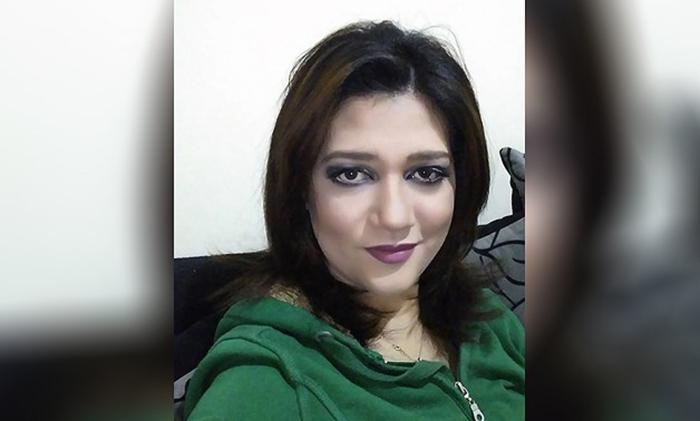
Activist Amal Fathy has been ordered detained. (Photo: Facebook)
Index on Censorship, the Egyptian Commission for Rights and Freedoms (ECRF) and counsel at Doughty Street Chambers have filed further information at the request of the UN Working Group on Arbitrary Detention (WGAD) in relation to their urgent appeal on behalf of Amal Fathy.
Ms Fathy, an Egyptian activist who made a video about her experience of sexual harassment in Egypt, was arrested in May 2018. She was initially arrested with her husband Mohamed Lotfy, and their two-year-old son. Lotfy leads ECRF, an award-winning organisation which coordinates campaigns for those who have been tortured or disappeared. Lofty and their son were released, but Ms Fathy remained in detention and was charged in relation to her social media post. She spent 230 days in prison on charges including “spreading fake news national security” and “belonging to a terrorist group”.
Caoilfhionn Gallagher QC, Jonathan Price and Jennifer Robinson filed an appeal against Egypt with WGAD on 24 July 2018 in relation to Ms Fathy’s ongoing detention. The appeal, filed jointly with ECRF and Index on Censorship, called on WGAD to issue a finding that her detention is arbitrary and in violation of Egypt’s obligations under international law, to call for her immediate release, and to ask Egypt to investigate her unlawful detention and to award her compensation.
Since the urgent appeal was filed, on 29 September 2018, Ms Fathy was convicted in relation to the first prosecution on charges of spreading fake news undermining national security and possessing indecent material and sentenced to two years in prison and a fine. Her appeal was dismissed on 30 December 2018. She has one final appeal to the Court of Cassation and was granted bail pending the appeal outcome. Her conviction was widely condemned, including by Amnesty International and by UN experts.
Ms Fathy also faces a separate state security prosecution which alleges belonging to a terrorist group. After significant international pressure and condemnation, she was released on 28 December 2018 with restrictive house arrest conditions pending trial. These restrictions were relaxed on 9 February 2019, but she remains at risk of imprisonment for exercising her internationally protected right to free speech and faces a further trial.
“The permanent threat of arrest is a means for Egypt to effectively silence Amal Fathy,” said Index on Censorship chief executive Jodie Ginsberg. “How many of us would be willing to speak out against abuse and injustice knowing we would be forcibly removed from our loved ones and forced to languish in jail for doing so? We urge the international community to renew its condemnation of Egypt’s actions and show they support the rights of women and of freedom of speech.”
Caoilfhionn Gallagher QC of Doughty Street Chambers said:
“Amal Fathy spent 230 days in prison, in unsanitary and unsafe conditions, without meaningful access to her lawyers, and away from her family and young son. Despite having now finally been released on bail, she continues to face imprisonment for speaking out about the rights of women in Egypt. The international community must condemn Egypt’s flagrant breaches of her basic rights to liberty, due process and dignity.”
The organisations have requested the WGAD to:
The next WGAD session will take place in April 2019.
Ms Fathy’s case has been covered widely in the media: here, here and here.[/vc_column_text][/vc_column][/vc_row][vc_row][vc_column][vc_basic_grid post_type=”post” max_items=”4″ element_width=”6″ grid_id=”vc_gid:1551088528643-05779c4e-6b84-7″ taxonomies=”25926″][/vc_column][/vc_row]
[vc_row][vc_column][vc_column_text]
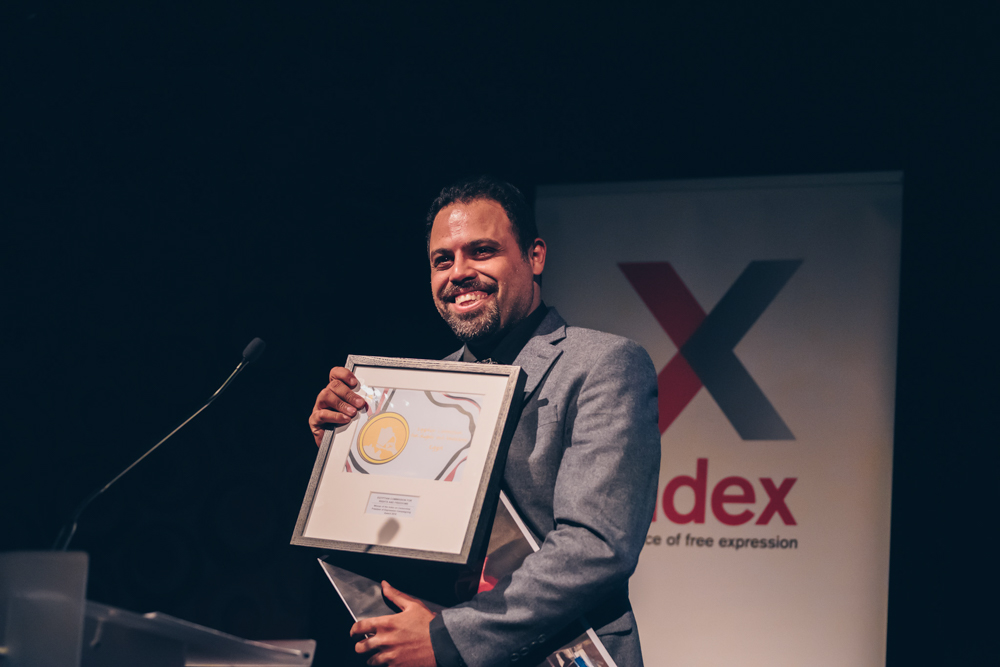
Ahmad Abdallah of Campaigning Award-winning Egyptian Commission for Rights and Freedoms at the 2018 Index on Censorship Freedom of Expression Awards (Photo: Elina Kansikas)
The Egyptian Commission for Rights and Freedoms, winner of the 2018 Index on Censorship Freedom of Expression Award for Campaigning, is one of the few remaining human rights organisations in Egypt, a country that often uses its struggle against terrorism as a justification for its crackdown on human rights. What’s more, in 2018 the group expanded its reach, opening new offices around the country, continuing to highlight human rights abuses and providing support for those facing repression.
In May 2018, Amal Fathy, wife of Mohamed Lotfy, executive director of ECRF, was arrested and charged with “spreading fake news” after posting a video in which she criticised the government and recounted her experiences of sexual harassment on the streets. She was later also charged with “belonging to a terrorist group”, for reasons that have yet to become clear. In late December 2018, Fathy was released, although remains under house arrest. Days later an Egyptian court upheld a two-year prison sentence against the activist, raising fears she could again end up behind bars.
Despite the difficulties it faces, it’s “business as usual” for the group and its work. Index spoke with three ECRF co-founders, Ahmad Abdallah, head of the board of trustees, Lotfy and Mohamed Sameh, international relations advisor to talk about these issues.
How is Amal doing and what has life been like since her release?
Mohamed Lotfy: There are ups and downs at the moment. Of course, she is very happy to be free, finally. However, she is anxious after the two-year verdict issued on the 30 December. We live day by day and we don’t know what might happen.
Ahmad Abdallah: Amal is very tired, she still needs medication. She used to have depression problem and it deteriorated while she was in jail. She has had a horrible experience. With her two year sentence, she can be picked up anytime. She was released on probation and is not allowed to leave the house. She goes to the police station every week. The two-year sentence was harsh and she can be taken any time. She is not well yet, she still needs medical care.
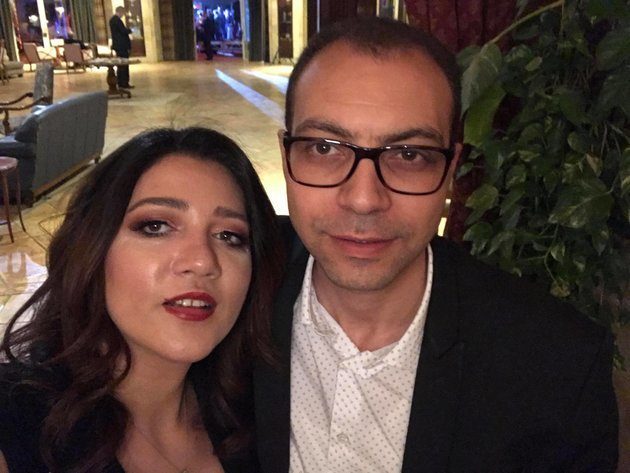
Mohamed Lotfy (right) with his wife, the imprisoned activist Amal Fathy
What does it mean to have Amal home?
Lotfy: It means a lot. It means that our family is reunited. The boy can stay with his mother and father in the same place after spending almost eight months without the two of us. I was visiting my family or her family where he was staying but now, for the first time in eight months, he can see his father and mother every day at home. It’s a big change for him, for her and for me as well. It’s a feeling of home.
Abdallah: It was very good to see them together once again. It was very good for her son to see her. We expected that we could start her treatment but, unfortunately, a couple of days later she took a very harsh sentence. We are all disappointed and sad. Amal is a good person — she shouldn’t be in jail.
Lotfy: I made an official request to the National Council for Human Rights asking for a presidential pardon after the court gave Amal two years prison. The ruling is a very negative message to send to Egyptian women, to say that a victim of sexual harassment could be imprisoned for calling out this plague while harassers remain free. There is a whole social and political dimension to this. If Amal is imprisoned women will be discouraged from taking any legal steps or speaking out against sexual harassment and this is highly problematic. This can be dealt with a presidential pardon.
People continue to be arrested in Egypt, from academics and lawyers to journalists and activists. How do you view the current situation in the country and do you see any signs of hope for improvement?
Lotfy: The image is very bleak. We’ve seen no progress in the last year. We hoped that there would be less crushing of the dissident and fewer arrests against dissidents after the presidential elections. However, these arrests continued and disappearances and torture have continued. The same record on human rights continued throughout 2018. But as long as there are people who are trying to make things better and defending human rights in Egypt, then there is hope.
Abdallah: The situation in the country is disastrous, but I believe in the Egyptians and I believe in the youth. They are the light at the end of the tunnel.
What was it like for Mohamed Sameh to meet with fellow Index award winners the Cuban Museum of Dissidence when he was in London? What struggles and hopes do you think you both share for your home countries?
Mohamed Sameh: It was great to meet with the fellow Index award winners the Museum of Dissidence in London. We share many views and very similar challenges and it was wonderful such a connection across the Atlantic. Building bonds of trust is essential not only for our work, but also showing us in practice that we are not alone in our struggle. It helps putting the challenges we face in perspective. When we heard of their arrest in December, they were no longer only names, but friends who needed our support. We are happy and proud that we stand together.
ECRF recently opened two new offices in Egypt, in Aswan and Mansoura. Why were new offices necessary and how will it allow you to realise the aim of becoming more digital and ensuring the safety of both yourselves and those you work with?
Lotfy: One of the critiques of human rights organisations is that they are very centralised in Cairo and don’t reach out enough to the population outside of the capital. This is very true, so we are trying to deal with this weakness by investing more time and resources and personnel elsewhere in areas that have needs that are a bit different. Cairo being a big city has mainly civil and political rights needs, while other areas have more human rights issues that have to do with health, economic rights, environment, labour rights and so on. We have to be able to care about the main civil and political rights that we find a lot in Cairo and the specific needs of areas in Egypt like Aswan and Mansoura.
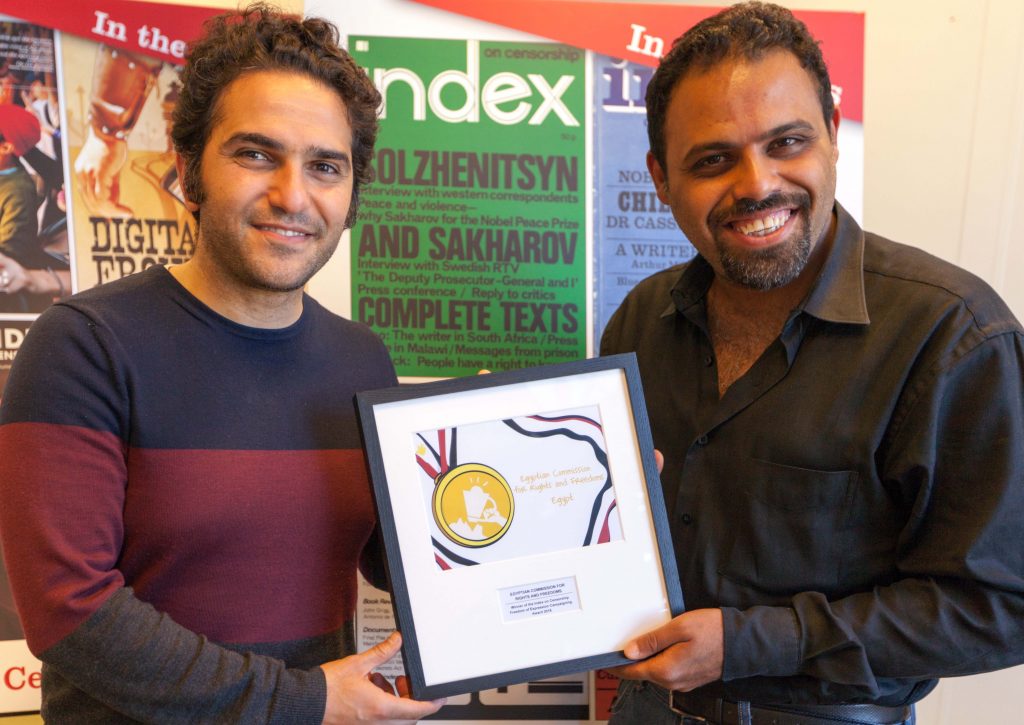
Human rights defenders Mohamed Sameh and Ahmad Abdallah of 2018 Freedom of Expression Campaigning Award-winning Egypt Commission on Rights and Freedoms. (Photo: Index on Censorship)
What does the Index on Censorship Fellowship mean to ECRF?
Lotfy: The fellowship from Index on Censorship has been very useful in opening our channels of communication with technology experts, with capacity building for staff members and senior members of management. But also, in the case of Amal, specifically, I was astonished by the amount of interest that Index has shown to the case of my wife either through publicity, lobbying but also through the complaints made to the UN. These were outputs and help that I did not expect and found very useful and freed my wife as well.
When members of our team travelled to Berlin for training in digital technologies, they exchanged ideas ideas about preparing the ground for the future of our human rights work and for the future generation of human rights activists that is more engaging, technology-oriented, secure and allows for a much bigger outreach of people interested in human rights.
Abdallah: The fellowship has really given us huge opportunities to improve and to progress in our work. It has opened new doors, especially in the use of technology in human rights.
Sameh: The Index award has been of utmost importance to us. It introduced us to a new terrain of co-operation and perspective. The dynamic it has created within our team has been vital for many of the steps we have undertaken since April 2018.
What lays ahead in 2019 for ECRF?
Lotfy: We continue to do our work. Business as usual. Every day we are still around and able to fight for human rights is a victory in the difficult circumstances we work in.[/vc_column_text][/vc_column][/vc_row][vc_row][vc_column][vc_basic_grid post_type=”post” max_items=”4″ element_width=”6″ grid_id=”vc_gid:1547050462858-06f4b172-7d5e-7″ taxonomies=”24136″][/vc_column][/vc_row]
[vc_row][vc_column][vc_single_image image=”103748″ img_size=”full” add_caption=”yes”][vc_column_text]
Her lawyer Ramadan Mohamed told Middle East Eye that her appeal had been rejected and that she would now serve jail time. Fathy is also accused of publishing offensive content, Mohamed said.
Jodie Ginsberg, CEO of Index on Censorship, said: “Index on Censorship is extremely disappointed at the decision to uphold the sentence against Amal. She should never have been charged or detained for expressing her opinion. All charges against her should be dropped and she should be released.”
Fathy and her husband Mohamed Lotfy, together with their young son, were detained after a night-time raid on their apartment on 11 May. Lotfy and the couple’s son were released after several hours, but Fathy has remained detained since then.
Following the Facebook video Ms Fathy was sentenced in September for “spreading fake news”. She also faced security-related charges, including for membership of a terrorist organisation.
Lotfy is co-founder and executive director of the Egyptian Commission for Rights and Freedoms, which received an Index on Censorship Freedom of Expression Campaigning Award in April 2018.
In May leading international human rights lawyers at Doughty Street Chambers, jointly with ECRF and Index on Censorship, lodged complaints with the United Nations rapporteurs on freedom of expression and human rights defenders regarding Fathy’s detention. In July, Doughty Street Chambers, ECRF and Index raised Fathy’s case with the United Nations Working Group on Arbitrary Detention.[/vc_column_text][vc_basic_grid post_type=”post” max_items=”4″ element_width=”6″ grid_id=”vc_gid:1546240564789-ca455c3f-0710-0″ taxonomies=”25926″][/vc_column][/vc_row]